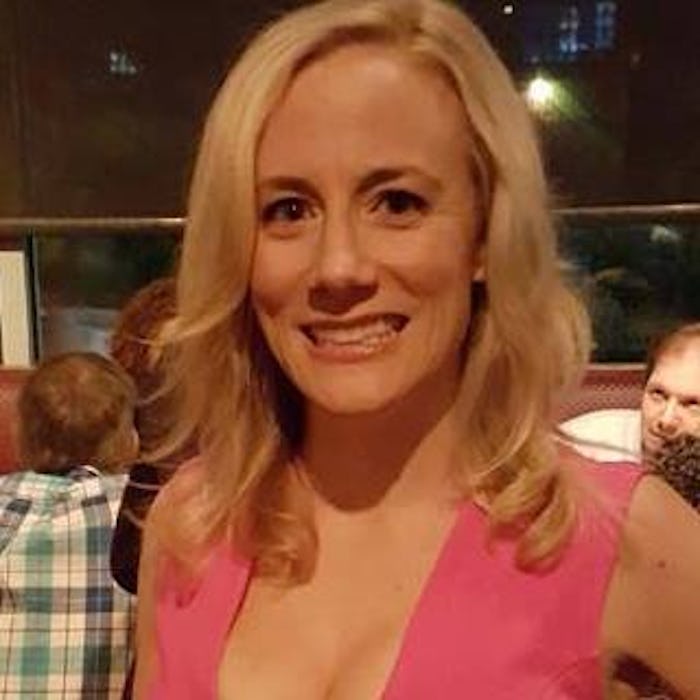Life

I Had An Eating Disorder, But Now I Look Forward To Thanksgiving
For the last 14 years, I've been in recovery from my myriad of disordered eating. I am lucky. So very lucky. I suffered from severe calorie restriction, body-checking, sometimes binging, over-exercising, and on very rare occasions, purging. It's not abnormal to have a combination of eating disorders or disordered eating. I am 14 years stronger, but celebrating the holidays after recovering from an eating disorder will always be hell. According to the National Association of Anorexia Nervosa and Associated Disorders, "about 50 percent of people who have had anorexia develop bulimia or bulimic patterns," and this time of year is always a reminder of my struggles with food.
The ghost of body image past still silently follows me, appearing on occasion, especially when people comment on my weight, even after being in recovery for 14 years. As a skinny, white woman, I know I am fortunate. I have a decent metabolism and bone structure, and American society often rewards women who are thin. I know that I am privileged, but my privilege never meant that an eating disorder was something I was automatically immune to or safe from. In my experience, being skinny and petite has always meant that people have the right to inspect my body and comment publicly without consequence. "How could it possibly hurt your feelings?" my guy friend once asked me, as if being slim is a "gift," something I should be thankful for, something I should be relieved people notice and comment on. No one stops to ask if his or her comments might offend me; no one stops to ask me how I feel. I had one man repeatedly refer to me as "skinny" at work until finally I got him to shut up by calling him "shorty."
An eating disorder has everything to do with control and sometimes has very little to do with weight. Sometimes it has little to do with the way people will see you and everything to do with the way you view yourself. Most people don't accurately know what an eating disorder is, or the fact that most have very little to do with food. The National Eating Disorders Association says that there are many factors that contribute to someone developing an eating disorder: physical or sexual abuse (which was a yes for me), a feeling or lack of control in one's life (which I somewhat suffered from), cultural norms of beauty (what woman doesn't deal with this?), and more.
When the holidays roll around, I remember what it was like to battle the buffet waiting for me at the Thanksgiving table. I remember what it was like to battle myself. Thoughts from that time period — will Dad mention I am eating cake? Am I eating cake? Do I skip the cranberry bread? No, don't skip the cranberry bread; it's your favorite part. But yes, yes, yes, skip the cranberry bread! How long will I have to work out to make up for today? — still haunt me.
I was tormented by the thoughts in my head. By my need to purge. By my need to punish. My mind was a rolling dialogue of shame that consumed me. I'd nod along to dinner-table conversation not really knowing what was said or whether or not it was funny. I'd answer questions vaguely, the way a person does when they're not listening. I couldn't turn the voice in my head off. I was a shell of my former self.
The meals would end and the tables would be cleared, but for the monster inside me, the show was only the beginning. I'd wonder: Will I gain weight? I'd ask a personal trainer (who was also a friend) if one meal was enough to make someone "very fat". His answers only confirmed that my worst fears were unfounded, but my mind heard just the opposite: One meal could put someone into slovenly territory. One meal could make you lazy. One meal could make you lose control. Forever. And then what would happen?
Holidays offer a small window into hell when you're recovering from an eating disorder. Will someone say I’m not eating enough? Will someone say I’m eating too much? Is everyone staring at me? Does everyone know? If I get up to use the bathroom, who will follow? Will anyone follow? Should I load up my plate? Have I taken too much food? Not enough? That one comment your uncle makes about how you didn’t eat the pumpkin pie could be the one comment to make you feel glorious (See, I didn’t eat it! I am powerful!) or ashamed (Why can’t I eat just one piece of pie without binging, without feeling bad, without punishing my body with a run immediately after the dishes are done?). Fourteen years may feel like an eternity, but the holidays are a reminder that the battle continues.
Thanksgiving is a marathon, not a sprint, and for someone with an eating disorder, you don't need to just get through one meal, you need to make it through a series of dishes and plates and options and sides and snacks and portions and desserts. You're struggling against the cheese and cracker platter and someone else is ready to pass around the salad, appetizers, and wine.
Fourteen years later, I don’t dread the holiday table. I look forward to it. But sometimes, the voice inside me says, “Don’t eat that." I tell the voices to shut up. I beckon them back to the far corners of my mind. I remind myself that eating healthy — eating food that makes me feel strong, feel mentally capable, feel satisfied — is most important. Then I go on with my life. I win.
Images Courtesy of Laura Lifshitz (3)